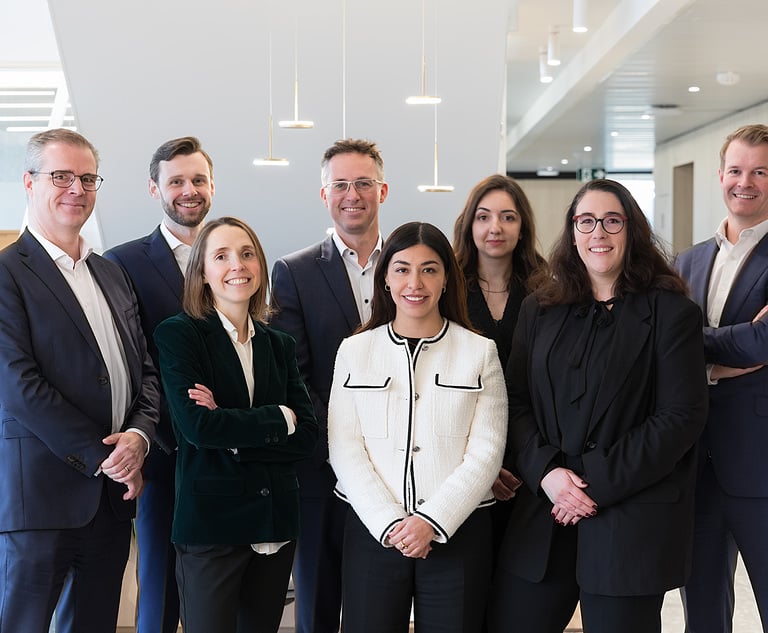Herbert Smith Freehills Forms China Association, Adds Local Law Ability
The firm will now have a Chinese law offering through a joint operation with Shanghai-based Kewei Law Firm.
August 07, 2019 at 05:00 PM
5 minute read
 Free Trade Zone, Shanghai, China. Photo: Tomohiro Ohsumi/Bloomberg.
Free Trade Zone, Shanghai, China. Photo: Tomohiro Ohsumi/Bloomberg.
Herbert Smith Freehills has formed a joint operation with a Chinese law firm, becoming the sixth global firm to gain access to a local law practice under the Shanghai Free Trade Zone (FTZ) programme.
The firm has been given regulatory approval for a tie-up with Shanghai-based Kewei Law Firm. The two firms, while legally separate, are able through a joint operation office in the FTZ to interact with clients as one team and integrate Chinese and international law advice.
In addition to Herbert Smith Freehills, Linklaters, Ashurst, Hogan Lovells, Baker McKenzie and HFW are currently in association with Chinese firms under the FTZ scheme.
Kewei currently has 23 lawyers, including three partners – founder Xu Wenbao, corporate partner Gavin Guo and capital markets partner Stanley Xie. Guo was most recently a Shanghai-based shareholder with Minnesota firm Fredrikson & Byron. Earlier in his career, he practised with Herbert Smith for seven years.
Xie specialises in securities offers related to the Hong Kong Stock Exchange. In 2017, he advised the underwriters of China New Higher Education Group Ltd.'s $95.5 million Hong Kong listing. He moved to Kewei last year from Herbert Smith Freehills, where he was most recently a senior consultant.
Both firms have already collaborated on matters in corporate transactions, international arbitration and antitrust issues. Herbert Smith Freehills' Greater China managing partner May Tai, who led the efforts for the international firm, said a key benefit of having Kewei as a partner firm in China is that it helps improve operational efficiency while working with Chinese co-counsel on matters.
Foreign law firms are barred from giving Chinese law opinions and are required by law to work with local counsel on matters concerning Chinese law. Tai said that with Kewei, Herbert Smith Freehills is able to be a trusted adviser to its clients on more matters. She noted a recent Hong Kong arbitration matter in which a client also wanted to initiate arbitration in mainland China and was suddenly in need of Chinese counsel.
"We were able to get Kewei on board overnight and they are good to go in the morning," she said. "With ad hoc co-counsel, clients would never be as comfortable."
The responsiveness and efficiency also helps Kewei. Guo cited a recent antitrust mandate in which a client, in addition to Chinese competition law matters, also raised issues of antitrust regimes in Hong Kong and Korea.
"We engaged Herbert Smith Freehills' offices in Hong Kong and Seoul and were able to provide one-stop-shop service to the client," said Guo. "Kewei didn't have that kind of international network. We wouldn't haven't been able to help with the client's other needs had we not had the partnership with Herbert Smith Freehills."
Kewei has also successfully represented one of Herbert Smith Freehills' longtime clients, a German automobile company, before Chinese courts in a product liability case. The Chinese firm also recently worked on Chinese law matters for the global firm's London office in an M&A deal in China.
Partnering with Kewei also helps Herbert Smith Freehills improve offerings to Chinese clients, especially state-owned enterprises. Both firms are currently working on China State Shipbuilding Corp.'s FTZ-based project to build China's first cruise vessel.
In addition to collaborating on traditional legal services, both firms will integrate their low-cost alternative services arms. Eight Kewei lawyers are part of a team that handles standardised high-volume documentation work such as due diligence and contract drafting for in-house legal departments. The team adds Chinese law capability to Herbert Smith Freehills' own alternative legal services (ALS) centres in Shanghai and Beijing.
Guo said the two ALS teams have completed more than 10 projects already and have recently landed a mandate from a global hotel chain operator to review franchise agreements in China. According to Tai, the combined ALS offering is the most popular request among clients.
In addition to the three partners, Kewei has recruited lawyers from premium Chinese firms, including King & Wood Mallesons, Fangda Partners, JunHe and Jingtian & Gongcheng since last year. Guo said Kewei is planning to add more lawyers during the next six to 12 months and expand collaboration areas, including capital markets, data privacy and financial services.
"We are very ambitious for our China practice," said Hebert Smith Freehills' Tai. "Kewei has [Herbert Smith Freehills'] support to grow. We have no plan to keep it a boutique."
Related Stories:
Linklaters Becomes First Magic Circle Firm to Gain Access to Chinese Law Capability
This content has been archived. It is available through our partners, LexisNexis® and Bloomberg Law.
To view this content, please continue to their sites.
Not a Lexis Subscriber?
Subscribe Now
Not a Bloomberg Law Subscriber?
Subscribe Now
NOT FOR REPRINT
© 2025 ALM Global, LLC, All Rights Reserved. Request academic re-use from www.copyright.com. All other uses, submit a request to [email protected]. For more information visit Asset & Logo Licensing.
You Might Like
View All
Singapore Litigators Shift Competitive Landscape as Another Senior Duo Sets Up Own Shop

Squire Patton Boggs Hires 7-Lawyer Team to Beef Up ESG Practice in Brussels
2 minute read

Skadden, White & Case Guide Citigroup Demerger in Mexico
Trending Stories
- 1Gibbons Reps Asylum Seekers in $6M Suit Over 2018 ‘Inhumane’ Immigration Policy
- 2DC Judge Chutkan Allows Jenner's $8M Unpaid Legal Fees Lawsuit to Proceed Against Sierra Leone
- 3Internal Whistleblowing Surged Globally in 2024, so Why Were US Numbers Flat?
- 4In Resolved Lawsuit, Jim Walden Alleged 'Retaliatory' Silencing by X of His Personal Social Media Account
- 5Government Attorneys Face Reassignment, Rescinded Job Offers in First Days of Trump Administration
Who Got The Work
J. Brugh Lower of Gibbons has entered an appearance for industrial equipment supplier Devco Corporation in a pending trademark infringement lawsuit. The suit, accusing the defendant of selling knock-off Graco products, was filed Dec. 18 in New Jersey District Court by Rivkin Radler on behalf of Graco Inc. and Graco Minnesota. The case, assigned to U.S. District Judge Zahid N. Quraishi, is 3:24-cv-11294, Graco Inc. et al v. Devco Corporation.
Who Got The Work
Rebecca Maller-Stein and Kent A. Yalowitz of Arnold & Porter Kaye Scholer have entered their appearances for Hanaco Venture Capital and its executives, Lior Prosor and David Frankel, in a pending securities lawsuit. The action, filed on Dec. 24 in New York Southern District Court by Zell, Aron & Co. on behalf of Goldeneye Advisors, accuses the defendants of negligently and fraudulently managing the plaintiff's $1 million investment. The case, assigned to U.S. District Judge Vernon S. Broderick, is 1:24-cv-09918, Goldeneye Advisors, LLC v. Hanaco Venture Capital, Ltd. et al.
Who Got The Work
Attorneys from A&O Shearman has stepped in as defense counsel for Toronto-Dominion Bank and other defendants in a pending securities class action. The suit, filed Dec. 11 in New York Southern District Court by Bleichmar Fonti & Auld, accuses the defendants of concealing the bank's 'pervasive' deficiencies in regards to its compliance with the Bank Secrecy Act and the quality of its anti-money laundering controls. The case, assigned to U.S. District Judge Arun Subramanian, is 1:24-cv-09445, Gonzalez v. The Toronto-Dominion Bank et al.
Who Got The Work
Crown Castle International, a Pennsylvania company providing shared communications infrastructure, has turned to Luke D. Wolf of Gordon Rees Scully Mansukhani to fend off a pending breach-of-contract lawsuit. The court action, filed Nov. 25 in Michigan Eastern District Court by Hooper Hathaway PC on behalf of The Town Residences LLC, accuses Crown Castle of failing to transfer approximately $30,000 in utility payments from T-Mobile in breach of a roof-top lease and assignment agreement. The case, assigned to U.S. District Judge Susan K. Declercq, is 2:24-cv-13131, The Town Residences LLC v. T-Mobile US, Inc. et al.
Who Got The Work
Wilfred P. Coronato and Daniel M. Schwartz of McCarter & English have stepped in as defense counsel to Electrolux Home Products Inc. in a pending product liability lawsuit. The court action, filed Nov. 26 in New York Eastern District Court by Poulos Lopiccolo PC and Nagel Rice LLP on behalf of David Stern, alleges that the defendant's refrigerators’ drawers and shelving repeatedly break and fall apart within months after purchase. The case, assigned to U.S. District Judge Joan M. Azrack, is 2:24-cv-08204, Stern v. Electrolux Home Products, Inc.
Featured Firms
Law Offices of Gary Martin Hays & Associates, P.C.
(470) 294-1674
Law Offices of Mark E. Salomone
(857) 444-6468
Smith & Hassler
(713) 739-1250








